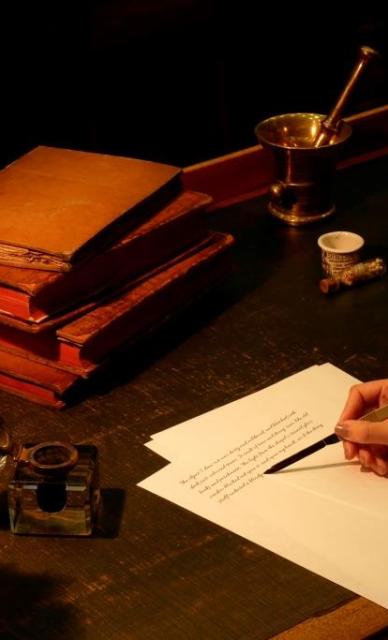Physicians' Gallery Newsletter
Updates on upcoming events, exhibitions and online stories
(22 September 1810 – 11 May 1882)
Fellow

Brown became a fellow of the Royal College of Physicians of Edinburgh in 1847.
Brown became a fellow of the Royal Society of Edinburgh in 1859.
Brown was awarded a royal pension in 1876 ‘for distinguished literary eminence’.
Brown was a prolific author and contributed to various newspapers and periodicals. He wrote a modest stream of essays on philosophy, art, literature, biographies, the scenery and natural history of Scotland. Brown wrote a short story about a dog titled “Rab and his Friends.”
• Horae subsecivae (1858) Brown’s collected works, published in three volumes
John Brown was born on 22 September 1810 in Lanarkshire to a minister of the Secession church there. His mother died when he was a child and his father moved the family to Edinburgh in 1822, where he became a distinguished teacher of theology. In 1826, Brown entered the University of Edinburgh where he studied arts then medicine. By 1827 he was an apprentice to surgeon James Syme. Brown wanted to become a physician rather than surgeon, however, and in 1831 became assistant to a Scottish doctor in Chatham. Brown graduated from Edinburgh MD and set up his own general practice. In 1840 he married Catherine Scott and their marriage produced three children.
In the 1840s while Brown was establishing his medical practice, he also made his literary debut. Brown authored works on various topics and from the outset his works were enthusiastically received.
Brown was at his best when writing about the effects of illness, such as his poignant, biographical account of Marjorie Fleming, a precociously gifted child who died of meningitis when not quite eight years old. ‘Marjorie Fleming’ is chiefly a running commentary on her diary and letters.
Some of Brown’s collected writings were published in 1858 as Horae Subsecivae, which featured a range of essays on medical topics, demonstrating Brown’s firm and decidedly conservative views. He was opposed to the practice of obstetrics by men, believing that labour should be attended solely by women who were specially trained and paid for the purpose. He was also opposed to specialisation, arguing that this would destroy the valuable relationship between the family physician and his patients. Women doctors and homeopathy were anathema to him. Another favourite topic was the dangers of some of the advances in scientific medicine which he had witnessed during his own career. Brown believed that many of the then-fashionable medical instruments were damaging to the education of the physician rather than of service. He made a strong distinction between the practice and the study of medicine. While conceding the merits of the external methods of auscultation he was unimpressed by the introduction of such procedures as microscopy and chemical analysis. Brown was of the opinion that, generally speaking, doctors ought to place less reliance on cases collected by very young men, and should be chary of giving too much significance to their findings.
He strongly advocated the apprenticeship system in the study of medicine, which avoided much of the evils of class teaching and learning from books. Another bugbear was the holding of examinations during medical studies, which he believed gave no true insight into the pupil’s skill in medical science and were merely tests of memory. Brown supported the idea that ornithology should be taught as a branch of medical education, believing this would cultivate the habit of observation.
Despite these views, Brown summed up the prime qualifications of a physician in the following words: ‘Let me tell you, my young doctor friends, that a cheerful face and step, and neckcloth and kindly joke, a power of exciting, a setting a-going, a good laugh, are stock in our trade not to be despised. The hearty heart does good like a medicine.’
Brown received his LLD from Edinburgh in 1874. He died from pleurisy on 11 May 1882, and was buried with his father and family in the New Calton Cemetery, Edinburgh. On his death, Mark Twain remarked that ‘He was the most extensive slave-holder of his time, and the kindest, and yet he died without setting one of his bondsmen free’.

Physicians' Gallery Newsletter
Updates on upcoming events, exhibitions and online stories